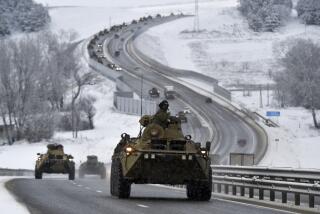Economic Policy May Be Altered to Minimize the Effect of Any War : Home front: The first action would reportedly be to tap the Strategic Petroleum Reserve.
- Share via
WASHINGTON — If the United States plunges into war against Iraq, top economic policy-makers may take a series of steps to minimize the impact of the war on the domestic economy, while seeking to ensure adequate supplies of energy, government and private analysts said Monday.
While it has not been publicly announced, the Bush Administration’s first action on the economic front, officials say, would be the quick release of 1.1 million barrels of oil a day from the nation’s Strategic Petroleum Reserve in an effort to calm the volatile oil markets.
The release would come as part of a coordinated international plan among the major industrialized nations to free a total of 2 million barrels a day from strategic reserves. Both Japan and Germany, the only other nations with major strategic reserves, would be expected to pitch in.
With roughly 587 million barrels now stored in the U.S. strategic reserve, the release of 1.1 million barrels a day would not be a major strain unless the war lasts much longer than most analysts believe. The reserve was established in the 1970s for just such an emergency.
Economists and oil experts say that the 1.1-million-barrel release would be sufficient to stabilize the oil markets during a war. While oil prices would be likely to skyrocket during the first few days of a conflict--perhaps to as high as $50 or $60 a barrel--prices would be likely to plunge again quickly after the release from the strategic pool, especially because oil supplies are now high and demand is skidding because of the recession.
Meanwhile, other economic policy moves would be likely to follow soon after the Administration’s intervention in the oil markets. Although no firm decisions have been made, officials say the Federal Reserve Board would be likely to at least continue its ongoing effort to cut interest rates to stabilize the banking system and to buoy a faltering economy. The Fed has been slashing interest rates since the Persian Gulf crisis began last August, and has accelerated its efforts to ease its grip on the economy over the last month, when it became clear that the recession was becoming more severe than initially expected.
But to avoid the appearance that it was completely abandoning its fight against inflation in order to finance the war, the Fed might wait at least a few days after the start of a war before making its next move to cut interest rates, analysts and Fed officials said Monday. Indeed, officials said the Fed has not made any deals with the Bush Administration on how to handle monetary policy in the event of war.
As a result, Fed officials would be likely to stress during the first weeks of a war that they were cutting interest rates only as part of an ongoing effort to battle the recession, and not to finance the military.
White House officials and congressional leaders would also be under growing pressure to abandon the cost-cutting discipline included in last fall’s five-year deficit reduction agreement. While the costs of Operation Desert Shield have been specifically exempted from the budget ax, a war would almost certainly depress the economy, and thus increase the size of the federal deficit--at a time when the recession is already having the same impact.
Under the rules of the budget accord, Congress and the President have the option of suspending the deficit-reduction agreement in the event of a recession. Top budget experts in Congress and the White House have said, however, that the leaders of both parties are opposed to suspending the budget rules just because of the recession.
But war may be another matter as far as the budget is concerned. If war is officially declared, then the budget agreement will be automatically suspended, even if Congress and the President oppose such a move, according to officials who have studied the rules at the Congressional Budget Office.
But they noted that the joint resolution passed during the weekend by Congress, which approved of the use of force against Iraq, does not qualify as a declaration of war for the purposes of the budget rules.
But Congress might be more willing to suspend the agreement should war break out, even if the Administration might still oppose such a congressional effort, budget office officials said.
If America finds itself embroiled in a lengthy war and the economy suffers as a result, some analysts believe that the rate of bank failures could escalate, as well.
Officials at the Federal Deposit Insurance Corp., which insures and regulates banks, said Monday that they don’t anticipate making any policy changes in the way they approach the ongoing banking crisis if war occurs. But some analysts believe that they should accelerate their process of taking over weak institutions if war begins, to avert an even worse crisis later.
More to Read
Sign up for Essential California
The most important California stories and recommendations in your inbox every morning.
You may occasionally receive promotional content from the Los Angeles Times.













